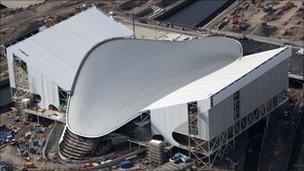London 2012: Welsh firms leaving their mark on Olympics
- Published

The 160m long wave-shaped roof weighs more than 3,000 tonnes
The roof of the Aquatics Centre at the Olympic Park is one of Wales' main contributions to building Olympic venues.
Newport-based Rowecord was responsible for construction of the 160m-long sweeping roof which at its widest point is 80m and weighs 3,000 tonnes.
Total CDM Solutions in Cardigan also worked with the main architect Zaha Hadid on the Aquatics Centre design.
But there are concerns that too few Welsh firms won contracts.
"Welsh companies have won infrastructure contracts for the Olympics that are worth around £38m," said BBC Wales business correspondent Nick Servini.
"It's less than 1% of the overall value of the work to build the site in east London.
"For companies like Rowecord in Newport, which built the roof for the Aquatics Centre, there have been benefits, but as the overall figure suggests, those have been few and far between.
"In reality I don't think business leaders in Wales were expecting a direct financial bonanza from the Games and they've been proved right.
"However, there could be more benefits for Welsh firms down the line in areas like security and catering, and of course there will be some economic benefits as a result of the training camps and the football matches held in Wales."
One of the key elements of the Olympic and Paralympic Games - the medals - will also be made in Wales.
The Royal Mint's Llantrisant headquarters will be making around 4,700 medals in total.
Modern gold Olympic medals are plated with about six grams of gold, while the runners up medals are struck from pure silver.
The designs of the gold, silver and bronze medals are set to be unveiled imminently.
The Welsh links do not end there, though.
Broadcast centre
Neath-based Express Reinforcements won a contract from the main contractor building the Olympic Stadium, while Euroclad in Cardiff won contracts on both the Olympic Stadium and the main broadcast centre.
Another Cardiff firm, Bluebay Building Products supplied reinforced concrete for the bridges and highways being built on the Olympic Park, while Rhino Doors from Port Talbot won a contract at the start of the project for entrance doors for the power lines tunnelling project.
B&W Tunnelling, based in Bridgend, provided drainage and buried services for the primary foul sewer and Pumping Station, and Flintshire-based Wagtail supplied sniffer dogs for the security team working at the Park.
"In fairness I think we've had a lot of sub-contract as well as main contract from Wales," said Laura McAllister, a professor of governance at the University of Liverpool's school of management.
"If you talk to any of the businesses, several of them across Wales, they've been absolutely delighted with the opportunity the Olympic and Paralympic Games have offered them to showcase the manufacturing and innovation that they do.
"It's a very, very positive spin-off."
- Published25 July 2011
- Published25 July 2011
- Published14 December 2010
- Published5 October 2010